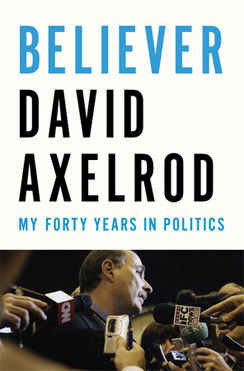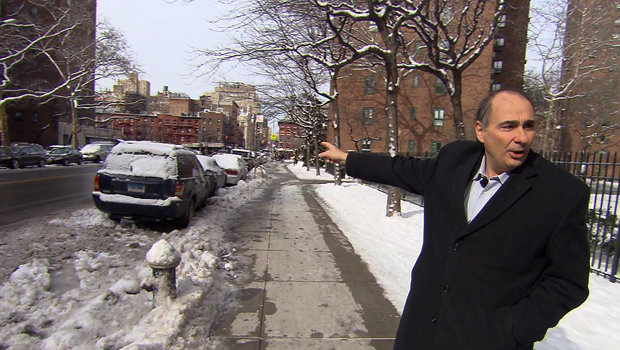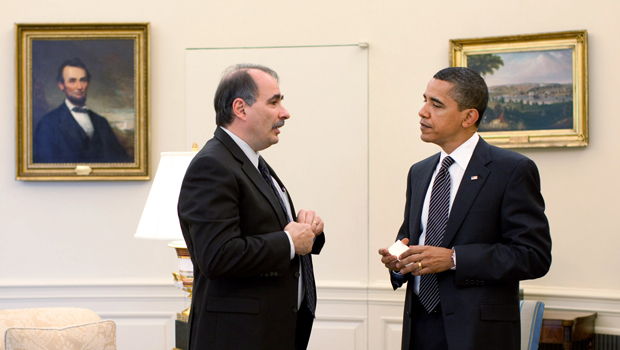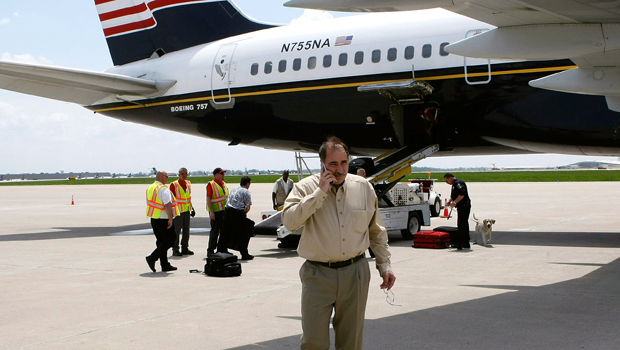David Axelrod: Hooked on politics
David Axelrod, until recently, was a White House aide and a true believer in the power of politics to change lives. Now retired from the campaign trail, Axelrod is looking back, and this morning, he shares his thoughts with Jim (no relation) Axelrod:
To understand David Axelrod, think less about Washington, D.C., and the Oval Office, and much more about Chicago . . . and Manny's Delicatessen.
"I always say I come here to clog my arteries and clear my head," he said.
Axelrod is the political consultant who fashioned "Yes, We Can" into a rhetorical machete that cleared the path to the White House for a first-term Senator with just two years under his belt.
"The conversations you have here are very reflective of what's going on in people's lives," he said. "I missed that when I was in Washington. I missed just the day-to-day interaction with people that you can have here on a regular basis."
He's back home now, after two years in the White House as a senior counselor and then heading up the 2012 reelection campaign -- spending time at the Institute of Politics he founded at his alma mater, the University of Chicago.
Axelrod has written a book, "Believer" (Penguin), a consideration of his 40 years in politics -- working for Democrats from Bill Clinton to Barack Obama, and plenty of the party's biggest names in-between.
"I realized in writing the book that the people who I was most drawn to were the people who really cared deeply about what they were doing and were fighting for something larger than just winning elections," he said.
Read an excerpt from "Believer"
Politics grabbed Axelrod early -- on the street where he grew up in New York City, mesmerized by John F. Kennedy in 1960. He was five.
"JFK was speaking down there, right in front of that store on the corner of 20th Street," he said. "And this whole boulevard that was always filled with traffic was filled with people instead."
Did he, as a five-year-old, have any idea who he was seeing? "I had a vague idea," Axelrod said. "But what was clear to me was that this was, like, really, really important."
He was hooked, starting work as a foot soldier in local elections by the time he was 10. His first job out of college was at the Chicago Tribune, soon working his way up to covering city politics.
"I was intrigued by campaigns and politics," he said. "I wrote about them with the eye of someone who was interested in strategy. So when the opportunity came, I was drawn to it."
That opportunity came in 1984, when Illinois Congressman Paul Simon needed help with his Senate campaign. He liked Axelrod's style, and the feeling was mutual.
"His pants were always about five inches too short, because some constituent bequeathed him six suits and he never got them tailored," Axelrod said. "He was that kind of guy. I knew he would never be corrupted. I knew that he would never embarrass me, and he never did."
Axelrod would spend the next 20 years crafting messages for big city mayors (Harold Washington), governors (Deval Patrick), and senators (Hillary Clinton).
Itching to find a presidential candidate, he signed on with John Edwards in 2004 -- learning an important lesson about the difference between politicians who wanted to do something and those who wanted to be something.
"I very quickly agreed to go to work for him, without really getting to know him, getting to know his wife, Elizabeth," Axelrod said. "And we just didn't groove.
"I felt that John was authentically sympathetic to the average working person; I don't think that he was terribly interested in really coming up with solutions. At the same time, I was working for Barack Obama who was running for Senate. It was striking to me the difference between the two of them, because Barack always wanted to drill three and four levels deep on these things, and he was really moved by what is the right thing to do.
"And I felt like John wanted to do what he needed to do to get to the next rung."
Obama would electrify the Democratic Convention in 2004 with his keynote address. "That convention speech was basically the political equivalent of being shot out of a cannon," said Axelrod. "And I turned to Robert Gibbs, our press secretary, who was standing with me. I said, 'You know, this guy's life just changed forever, and maybe ours did, too.'"
In a little more than four years, Barack Obama went from state senator to the inauguration platform -- too swift a journey, say some critics.
When asked if he might have been a more effective president with a few more years under his belt to learn how Washington works, Axelrod replied, "I think that history will say that he was the right man at the right time, because there were a series of decisions that had to be made when he became president that required you to suspend the normal rules of Washington.
"I think to the auto worker who's got a job today because the president intervened to save the auto industry, to someone who has healthcare today because he was willing to take the chance to do health reform, to military families who have their loved ones home instead of overseas because we don't have 180,000 troops overseas today, that's pretty big change. That's pretty good progress."
While Axelrod hasn't lost a step advocating for the president, it's clear the man behind the message thinks at times the boss could've done better job delivering it.
"I think one of the weaknesses has been that he doesn't apply the same campaign skills to governing," he said, "the same driving of a message relentlessly. I believe that you can't dismiss politics from governing."
Did President Obama's inner circle (including Axelrod) fail him by not making sure he understood you can't just govern?
"Well, I think his failures, any failures of his, are failures of ours as well," said Axelrod. "I can only tell you that we had that kind of philosophical, strategic discussion many times."
So who was right -- the advisor or the president?
"I think I'm right about it," Axelrod said. "I think that you have to have a kind of continuing commitment to an ongoing message that is palpable, that people feel."
Axelrod is now taking stock, and not just of the public part of his life.
Thirty-five years ago, his wife, Susan, had thought she was marrying a reporter who'd be home most nights.
When David told Susan that he was giving up his newspaperman job to go work in politics, she thought it was a good idea.
"I actually did," said Susan, "And had, I think, known really what being in politics would be like, I might not have been quite as supportive, but I was sort of blissfully naïve."
Instead, his all-consuming passion left her a campaign widow for months at a time, often alone with three kids, including a daughter with debilitating epilepsy.
"My family made huge sacrifices for my success, in ways that I look back at not just with gratitude, but a little bit a shame," said Axelrod. "And that's a hard thing to come to grips with."
But like many couples who've wrestled with the balance between life, careers and marriage, they punched through. "Belief," it appears, runs a few different directions in David Axelrod's life.
Susan said, "I have sort of an undying confidence and faith in his strength and ability to really affect change in the world. And that's a sacrifice for us personally, but I do believe in him wholeheartedly. And yeah, I've probably never said that to [him] in person!"
Soon to be 60, David Axelrod is happy to be home, and sounding very much like a man who's all done with presidential politics.
So, if Hillary Clinton or Joe Biden picked up the phone, and said, "I need you," what would Axelrod's answer be?
"Happy to give you any advice you want, but I'm not going back on that circuit," he replied. "It's exhilarating, it's addictive, but it's also not good for you. I'm done."
For more info:
- "Believer: My Forty Years in Politics" by David Axelrod (Penguin); Also available in eBook, Unabridged Audio Download and Unabridged Audio CD formats



